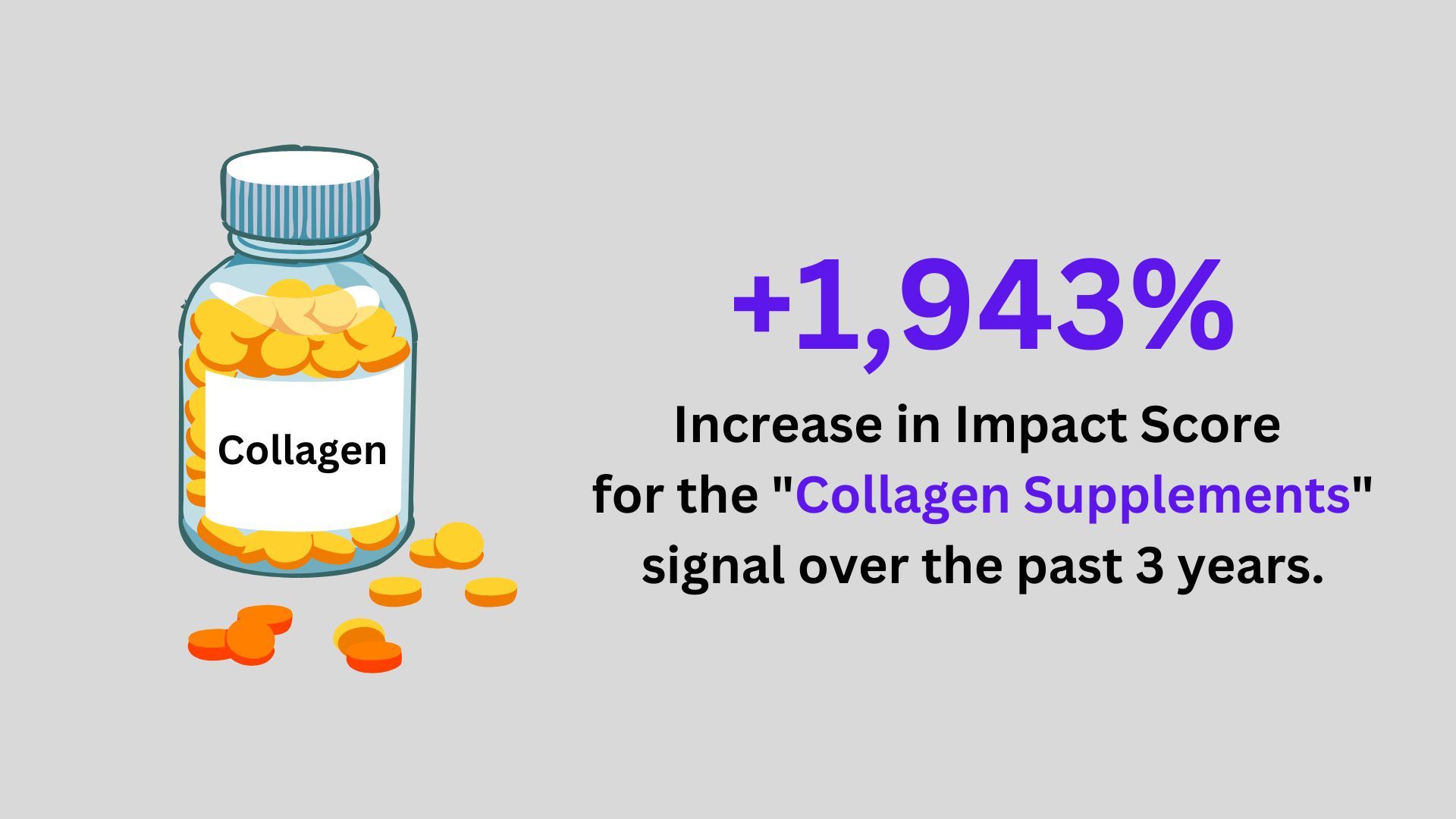Edited by Christian Thompson and Caitlyn Booton
Hello readers and welcome back to this week’s Inflection Point. This week we are covering collagen supplements and why they are growing in popularity.

Collagen is a crucial component of the health of bones, skin, muscles, and other body parts. Consumers look for collagen supplements to support these body parts with added benefits. Collagen is the most abundant protein in your body and is the main component that makes up several body parts, including tendons, ligaments, skin, and muscles. People get collagen from foods such as bone broth or food rich in Vitamin C to promote collagen synthesis. Collagen in supplements has already been broken down, or hydrolyzed, which is why it is thought to be absorbed more efficiently than collagen from foods.
The absorption of collagen into the body may factor into the growth of the supplement. Over the past three years, the impact score for Collagen Supplements has increased by 1943%. The future estimate forecasts continued growth throughout the following year. What may have caused the growing consumer interest in collagen supplements?
Collagen supplements can have many benefits and support a wide range of bodily functions. Collagen supplements have been known to aid in hair growth, skin health, muscle recovery, joint pain, and bone density. Collagen has other benefits, but these are some popular reasons why consumers look to collagen supplements. All of these benefits have increased rapidly over the past three years, with three out of the five signals experiencing increases higher than 2500%. The consistent growth from these signals illustrates the potential growing need for collagen supplements that specifically target these benefits.
Another reason that may factor into the growth of collagen supplements is the aging population. According to the World Health Organization (WHO), one in six people in the world will be 60 years or older, by 2030. An aging population may present an opportunity for companies that leverage collagen in their products to battle the ailments of the aging process. Some of these ailments include hair loss, skin degeneration, muscle loss, joint pain, and bone density. Collagen can help treat these and support better overall health. It seems that companies that specialize in products with anti-aging qualities, such as collagen supplements, may stand to gain from this shift in consumer interest. We wanted to use the platform to see which collagen supplement products are generating the most consumer energy.
Collagen has many benefits, but there are different types of collagen that serve different purposes when taken as a supplement. There are over 28 different types of collagen, but three of the most common are Type I, Type II, and Type III collagen. Common ingredients that include these types of collagen are Collagen Peptide, Marine Collagen, and Cartilage Collagen. Collagen peptides are primarily composed of Type I collagen, but also contain Type III collagen. Marine collagen is rich in Type I and III collagen. Cartilage collagen is only Type II collagen because Type II is the main component of cartilage in the body. Cartilage collagen can be taken to help with joint pain and can be beneficial for consumers using their joints often.
Over the past three years, the impact scores for Collagen Peptides, Marine Collagen, and Cartilage Collagen increased exponentially, and all the future estimates forecast growth in the following year. Collagen Peptides and Marine Collagen outrank Cartilage Collagen when comparing relative impact scores, which may be due to the broader benefits offered by Collagen Peptides and Marine Collagen. All types of collagen possess benefits, and based on this data, companies that position themselves with collagen-based products or supplements stand to gain from this shift in consumer interest.
Thanks for tuning into this week’s Inflection Point. We hope you learned something about collagen supplements and the benefits they can possess. Don’t forget to tune in next week to see what trends we cover next.
Cheers!